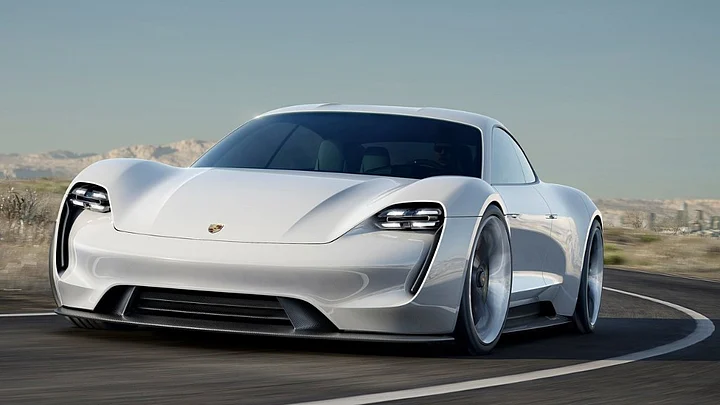First unveiled at the 2015 Frankfurt Motor Show, the Prosche Mission E Concept has been given its production name at the German Carmaker's 70th Anniversary Conference in Stuttgart - The Taycan, about a month after former F1 driver Mark Webber tested it out:
The name, announced by Porsche CEO Oliver Blume means the Lively Young Horse, a reference to the horse that tajes centrestage on the Porsche crest.
This will be the first completely electric car by an authentic German car maker that might give headache to Tesla, here’s what all the Taycan has to offer:
The development of the car is being headed by Stefan Weckbach, Head of Porsche’s Battery Electric Vehicles, who was also the development head for the Boxster.
The Taycan is based on the J1 electric platform, one of three new electric car platforms being developed by Porsche’s parent company Volkswagen.
What the Lively Young Horse Has in Store
Porsche has kept the details around the specifications of the car very vague. Porsche says the car produces 'more than 600bhp of power', goes from 0-100 kmph in 'less than 3.5 seconds' and has a top speed of 'more than 250 kmph', without giving the exact figure on either.
Porsche has also said that the car will propel from 0 to 200 kmph in 'less than 12 seconds', we don't know how to feel about that.
The car will house a lithium-ion battery-powered dual electric motor architecture with two electric motors - one for each front and rear axles, making it an all wheel drive. The batteries used on the Taycan are permanent magnet synchronous batteries.
Both the batteries put out a total of 440kW power, which is close to 600bhp. According to its NEDC cycle, the Taycan will do 500 km or 310 miles. Porsche's first electric car will also have multiple driving modes, including a sport plus mode.
Not a lot is known about the interiors but the Taycan is said to be more like the Mission E Cross Tourismo Concept from the inside.
In order to maintain acceleration all the way upto the top speed, the Taycan will use a two-speed gearbox. Generally, EV's don't have a transmission as they are powered by a motor rather than an engine but in order to ensure linear acceleration, Porsche has opted to go with a twin speed gearbox on this one.
The brakes on the Taycan are also unconventional. It will use computer blended braking which means that the brake pedal on the Taycan will not be physically linked to the brakes.
The break pedals will, instead, work as monitors to read the input from the driver and engage brakes accordingly. This technology was first seen on the new Honda/Acura NSX that debuted in 2016. The car could also invoke the rear ABS without even using the discs.
Porsche also claims an 80 percent charge within 15 minutes, if the right charger is used.
They are planning to set up a charging station network across Europe, with a charging station at every 75 kilometer by 2020.
Updates — More Than Just Software
Blume also comfirmed that Porsche is also working on software that allows over the air updates like Tesla. Blume also said that the car might be able to charge up more power with updates. According to Top Gear, the company will also give owners an option to even upgrade their batteries when better ones become available.
Mission E Cross Concept
Porsche also revealed a crossover variant for the Taycan at this year's Geneva Motor Show, The Mission E Cross Tourismo Concept which gave a more rugged avatar to the Taycan. The Mission E Cross Turismo concept is based on the same platform but with increased ride height and an estate body.
Going Big With E-Mobility
End of Porsche’s Driving Pleasure USP?
The Taycan might also be the car that will compromise what the name Porsche has been about - Driving pleasure as Autocar UK has reported to have spotted a panel of autonomous sensors in the car's nose, nestled between what appear to be two sets of louvres in the lower grille. These can also be opened to allow battery and brake cooling.
Porsche's CEO Oliver Blume also confirmed that Porsche plans for the Taycan to have Level 4 autonomous driving technology but denied that it would allow fully autonomous driving over longer distances.
(At The Quint, we question everything. Play an active role in shaping our journalism by becoming a member today.)
